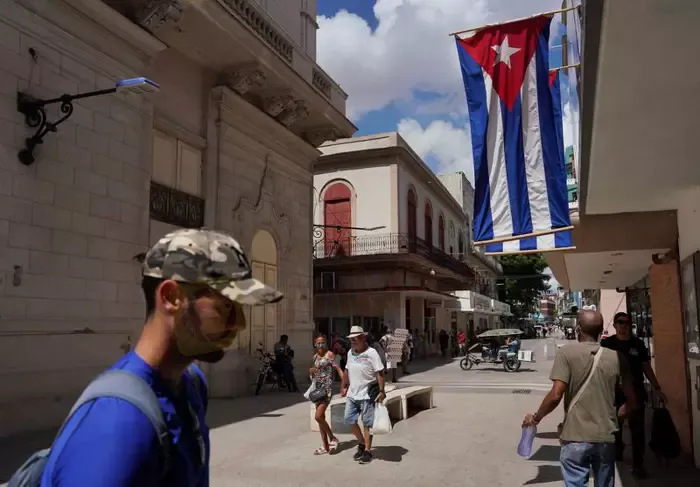简体中文
繁體中文
English
Pусский
日本語
ภาษาไทย
Tiếng Việt
Bahasa Indonesia
Español
हिन्दी
Filippiiniläinen
Français
Deutsch
Português
Türkçe
한국어
العربية
Cuba more than quadruples dollar/peso exchange rate
Abstract:Cuba announced it will begin purchasing on Thursday dollars and other convertible currencies at nearly five times the current rate in an effort to undercut the informal money market and capture the funds.

Central Bank President Marta Wilson Gonzalez, appearing on state-run television on Wednesday evening, said the state-run banking system had set a new rate of 120 pesos to the dollar, compared to the official fixed rate of 24 pesos, and 115 pesos on the informal market, according to independent online news outlet El Toque tracker, the most watched in the communist-run country.
Gonzalez said the new rate would float and did not apply to most activities of the state-dominated economy which would still operate at the fixed rate in effect for more than 18 months.
Cuba stopped accepting dollars in 2020 citing U.S. sanctions and stopped selling convertible currency for pesos to the public soon after, stating it simply did not have the cash.
Economy Minister Alejandro Gil, appearing with the central bank president on Wednesday, said in the near future he hoped to resume currency exchanges, but the first step would be capturing the informal market.
“Today there is a high level of foreign currency that is entering the country that is not being captured by the national financial system,” he said.
Hit by harsh new U.S. sanctions, the pandemic and current high international prices for goods and shipping, the near-bankrupt, import-dependent economy grew 1.3% last year after declining 10.9% in 2020. Gil said a gradual if slow recovery continued without giving figures.
Shortages of food, medicine, fuel and now electricity have led to scattered protests in recent months.
Pavel Vidal, a former Cuban central bank economist who teaches at Colombias Pontificia Universidad Javeriana Cali, said the measure addressed a major complaint of tourists who exchanged money at the fixed government rate in hotels and then discovered outside on the street everything is pegged at the informal rate.
Vidal said it would also benefit “the private sector which often receives foreign currency from tourists and that the banks will once more accept and exchange physical dollars at 120 which unlocks one of the major impediments that remittances had as they were fetching 24 pesos.”

Disclaimer:
The views in this article only represent the author's personal views, and do not constitute investment advice on this platform. This platform does not guarantee the accuracy, completeness and timeliness of the information in the article, and will not be liable for any loss caused by the use of or reliance on the information in the article.
Read more

The Daily Habits of a Profitable Trader
Every professional trader follows a structured approach to ensure they are well-prepared, disciplined, and able to seize opportunities with confidence. Whether you are a seasoned investor or an aspiring trader, adhering to a robust daily checklist can significantly enhance your performance. Use this checklist to check if you are a qualified trader

The Impact of Interest Rate Decisions on the Forex Market
Interest rate changes determine currency attractiveness, influencing capital flows and exchange rate trends. Understanding this mechanism helps investors navigate the forex market effectively.

How a Housewife Lost RM288,235 in a Facebook Investment Scam
A 47-year-old housewife in Malaysia recently fell victim to an online investment scam, losing a substantial sum of RM288,235 after engaging with a fraudulent scheme advertised on Facebook.

A Trader’s Worst Mistake: Overlooking Broker Reviews Could Cost You Everything
In today’s digital age, reviews influence nearly every decision we make. When purchasing a smartphone, television, or home appliance, we pore over customer feedback and expert opinions to ensure we’re making the right choice. So why is it that, when it comes to choosing an online broker where real money and financial security are at stake many traders neglect the crucial step of reading reviews?
WikiFX Broker
Latest News
The Withdrawal Trap: How Scam Brokers Lure Victims into Paying More
FCA to Investors: Think Twice Before Trusting These Brokers
Trump\s tariffs: How could they affect the UK and your money
Trump gambles it all on global tariffs he\s wanted for decades
TradingView Brings Live Market Charts to Telegram Users with New Mini App
Trump tariffs: How will India navigate a world on the brink of a trade war?
Interactive Brokers Launches Forecast Contracts in Canada for Market Predictions
Authorities Alert: MAS Impersonation Scam Hits Singapore
Stocks fall again as Trump tariff jitters continue
IG Group Acquires Freetrade for £160M to Expand UK Investment Market
Currency Calculator







